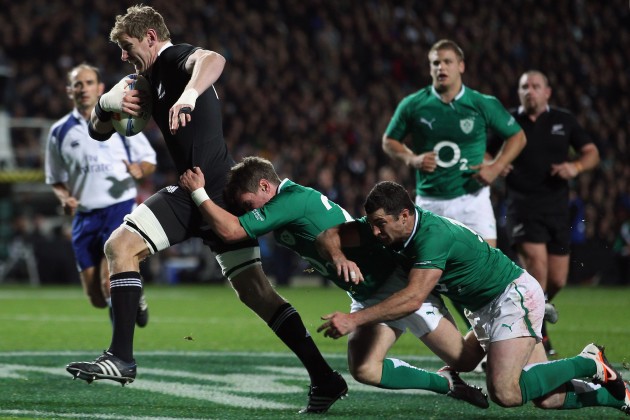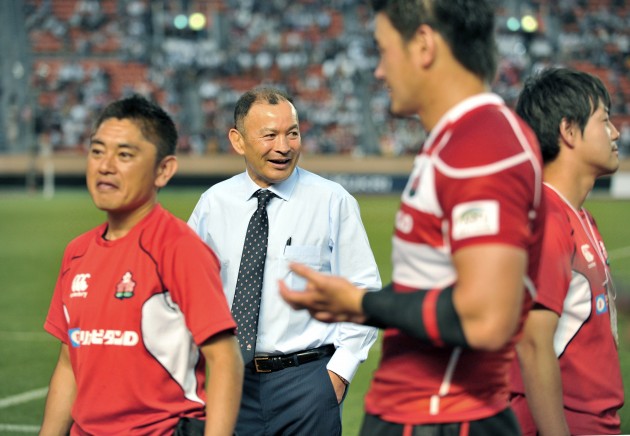We ask a former All Black now in Japan: can an 'easier' few seasons in Japan make you great on the international stage again?
What’s going on in Japan? While players are heading over there for short stints, some cash and some rugby the Brave Blossoms are improving on the international stage.
There are vast sums of money there, big international players are scattered throughout the Top League, and now the Japan national side are into the top ten of the IRB’s official world rankings. Most probably some still snigger about the level of rugby being played there, but while the Japanese have a truncated domestic calendar, things are undoubtedly improving.
Here is the anomaly: many playing over there tell of less-bruising competition and less rugby in general, but the country have the 2019 World Cup coming, Japanese stars are filtering into Super Rugby and further afield while Super Rugby players are now prepared to travel to Asia instead of Europe. This is all promising stuff, but now big players southern hemisphere stars are coming out the other end as well, ready to play at the top of international rugby again.
Look at Jerome Kaino.
The all-action back-rower recently returned to the Auckland Blues after a stint in Japan just after winning the 2011 World Cup with the All Blacks. There were doubts about whether he could hack it at the top again, but Steve Hansen recalled the breakaway for the recent Test series against England and he thrived, starting all three matches.
This guy had gone to Japan, a suspected retirement home for Test men, and instead has returned in better shape than almost any other 31-year-old smasher. What’s the deal?
“Jerome was able to rejuvenate the body while working on skills with decreased physicality in the Japanese league and I think we are seeing the benefits of the man being healthy and hungry again,” former All Black No 8 and current Canon Eagle Adam Thomson tells Rugby World.
“Jerome has coped very well with his return from Japan to NZ rugby because he is a world-class player and unmatched when physically fit and on top of his game. By the end of 2011 the demands on him were huge and the physical toll of playing that style of rugby will eventually wear you down. Japan has given him the opportunity to refresh in a new environment.”
So hold on. Japanese rugby is easier, so you can, like George Smith, come right back in to Test rugby after kicking back for a while?
Thomson, affectionately known as the Wooly Mammoth around Dunedin, explains: “I already feel regenerated since moving to Japan, myself. When I left in 2012 I was pretty beat up from back-to-back super rugby and internationals. Coming to Japan I have had the benefit of a five-month preseason. Five months (worth of work) over only six weeks back home (in New Zealand) is massive. I can’t remember if I have ever felt physically better prepared for rugby and the results are showing with personal bests in fitness testing and feeling great on the field. I don’t know if I want to come home but I have no doubt that I would be physically ready to do so if the desire arises.”
This must be good news for coaches who have seen their players head to the Far East.
While Japanese players have clearly benefited from playing alongside internationals – though we cannot deny the input of good coaches like Eddie Jones and the future input of Steve Borthwick, Robbie Deans, Gary Gold and Rob Penney for Japanese kids playing pro rugby – it is the big internationals who may be more happy that they may have some ‘rejuvinated’ old hands set to come back.
It is rumoured in France that Israel Folau will snub the French Top 14 to sign up to play in Japan in the near future. Off course, there are a few big players there already.
All Blacks Richard Kahui, Anthony Boric and Isaia Toeava do not have long left in Japan, should they refuse to renew current contracts and lauded team player George Whitelock is leaving Crusaders to join Panasonic Wild Knights.
South Africans Jaque Fourie and Fourie du Preez still feature for the Boks while playing their rugby in Japan, but there are others who are out there potentially rebuilding. Peter Grant and Andries Bekker are out there while still-young Frans Steyn staged a walkout with the Boks and is now just a Japanese club player, while Schalk Burger will be a Sungoliath. Stranger things have happened than such players heading back to Super Rugby.
It would be naïve to suggest that all of these guys are involved in Japanese rugby just to sup at the Fountain of Youth. But prolonging a career and smoothing out some old knocks could be a lovely by-product of chasing eastern coin and who knows, the local lads and Brave Blossom stalwarts could continue to raise their game thanks to these foreign interlopers.








